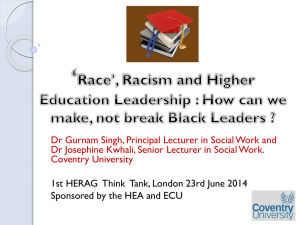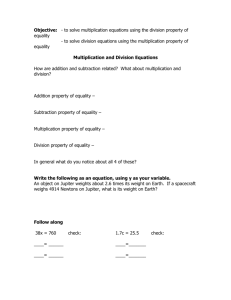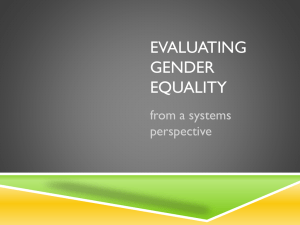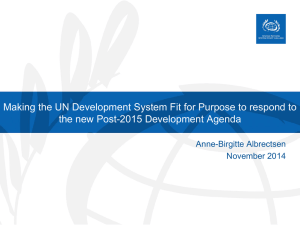Planning for Equality in a Conservative Region
advertisement
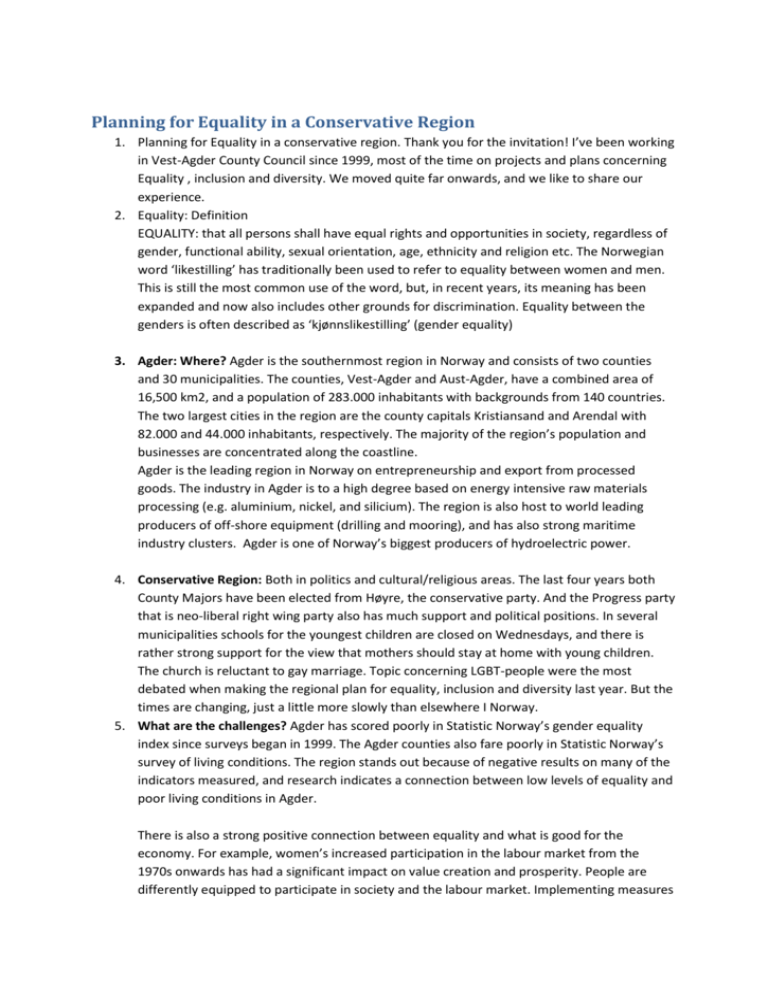
Planning for Equality in a Conservative Region 1. Planning for Equality in a conservative region. Thank you for the invitation! I’ve been working in Vest-Agder County Council since 1999, most of the time on projects and plans concerning Equality , inclusion and diversity. We moved quite far onwards, and we like to share our experience. 2. Equality: Definition EQUALITY: that all persons shall have equal rights and opportunities in society, regardless of gender, functional ability, sexual orientation, age, ethnicity and religion etc. The Norwegian word ‘likestilling’ has traditionally been used to refer to equality between women and men. This is still the most common use of the word, but, in recent years, its meaning has been expanded and now also includes other grounds for discrimination. Equality between the genders is often described as ‘kjønnslikestilling’ (gender equality) 3. Agder: Where? Agder is the southernmost region in Norway and consists of two counties and 30 municipalities. The counties, Vest-Agder and Aust-Agder, have a combined area of 16,500 km2, and a population of 283.000 inhabitants with backgrounds from 140 countries. The two largest cities in the region are the county capitals Kristiansand and Arendal with 82.000 and 44.000 inhabitants, respectively. The majority of the region’s population and businesses are concentrated along the coastline. Agder is the leading region in Norway on entrepreneurship and export from processed goods. The industry in Agder is to a high degree based on energy intensive raw materials processing (e.g. aluminium, nickel, and silicium). The region is also host to world leading producers of off-shore equipment (drilling and mooring), and has also strong maritime industry clusters. Agder is one of Norway’s biggest producers of hydroelectric power. 4. Conservative Region: Both in politics and cultural/religious areas. The last four years both County Majors have been elected from Høyre, the conservative party. And the Progress party that is neo-liberal right wing party also has much support and political positions. In several municipalities schools for the youngest children are closed on Wednesdays, and there is rather strong support for the view that mothers should stay at home with young children. The church is reluctant to gay marriage. Topic concerning LGBT-people were the most debated when making the regional plan for equality, inclusion and diversity last year. But the times are changing, just a little more slowly than elsewhere I Norway. 5. What are the challenges? Agder has scored poorly in Statistic Norway’s gender equality index since surveys began in 1999. The Agder counties also fare poorly in Statistic Norway’s survey of living conditions. The region stands out because of negative results on many of the indicators measured, and research indicates a connection between low levels of equality and poor living conditions in Agder. There is also a strong positive connection between equality and what is good for the economy. For example, women’s increased participation in the labour market from the 1970s onwards has had a significant impact on value creation and prosperity. People are differently equipped to participate in society and the labour market. Implementing measures to ensure participation by everyone – investing in people – is expensive, but it costs even more not to. When groups are excluded, society loses out on their contributions to the community, and vicious circles, such as increase differences in health, often arise. Unless systematic efforts are made to prevent and reduce these differences, the cost to society will be high, both in terms of welfare benefits, health expenditures and loss of income. 6. Latecomer – and role model! “The Agder region’s political approach to equality is virtually unparalleled at the regional level in Norway. Equality is discussed and emphasised as an important issue in regional planning processes, and development work is being done in several areas. The Agder region can therefore be described as both an equality latecomer and an equality role model.” 7. From 2008: Long term commitment for Equality. Across-party agreement has been achieved that equality, inclusion and diversity should be a long-term and systematic priority in Agder. The projects Fritt valg (Free choice) (2008–12) and Likestilling som regional kraft (Equality as a regional force) (2012–15) are other important elements of the long-term commitment. Both projects have developed tools and structures to improve equality through cooperation in the region.The Centre for Gender Equality at the University of Agder was established as part of the region’s long-term commitment to ensure that work on equality is knowledge-based. Several other projects and measures have contributed to developing the regional platform for better and broader equality work, some of them with a multicultural perspective. 8. 9. 10. 11. 12. 13. 14. 15. 16. 17. 18. 19. 20. 21. 22. Reluctance due to `Equality` resembling Women’s lib and radical movements. The first joint project: Free Choice. From kindergarten to university. Discovering equality Boys and men in kindergartens Tools and manuals for Equality in kindergartens and schools The next joint project: Equality as a Regional Force Moving from projects to equality mainstreaming Equality in the strategic regional planning The LIM-plan – in accordance with the Plan and Building Act. The strategy in Kristiansand: It’s all about People Other municipal plans or strategies in progress. Wide participation in developing the plans. Anchored in the management. Leaders must be spokesmen. Main Objectives – 12 years perspective Five topics: Democratic participation, education, equality in labour market and workplaces, equality of public service and protection against harassment and violence. 23. An action programme that will be reviewed annually. 24. Important measures: Equality mainstreaming in counties and municipalities organizations. A network for full time employment. A network focusing on immigrants/refugees access to paid employment. Developing a national equality and diversity standard for workplaces. 25. Success is dependent on prioritization. Both people and money is required.





